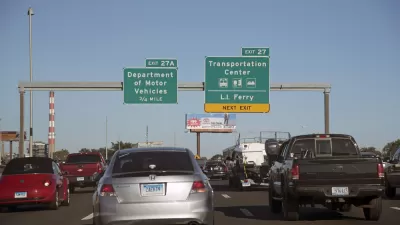Discussion on increasing user fee revenue has centered on increasing and/or indexing the gas tax and applying VMT fees. Now some are pushing a return of the original user fee - road tolls applied by states or regions on interstate highways.
Tolls existed before the gas tax, they were the first transportation user fee. In fact, they existed before there were cars. According to Wikipedia, "(t)he first major toll road in the United States was the Philadelphia and Lancaster Turnpike, built in the 1790s."
As with all revenue mechanisms, road tolls come with problems, as does increasing the gas tax or implementing the much discussed but still largely theoretical Vehicle Miles Traveled (VMT) fee (except in Ore.). For starters, applying tolls to interstates is largely prohibited (except where grandfathered prior to the 1956 Interstate Highway Act). Ryan Holeywell reports on why they are being considered now, what stands in their way, and their proponents and opponents.
The biggest booster is Patrick Jones, "who leads the trade association representing toll owners and operators and the businesses that serve them" - the International Bridge, Tunnel and Turnpike Association (IBTTA). Jones makes a convincing argument for "Congress to simply lift the ban on interstate tolling, allowing states and cities to generate their own revenue".
"For more than 50 years, we've relied pretty heavily on the gas tax to fund the construction and maintenance of roads in this county," Jones says. "Now the well has run dry."
Indeed, as we reported in Transportation Insolvency 101, with the Highway Trust Fund (HTF) approaching insolvency, Congress has essentially three options: raise the gas tax by 10-cents (how likely is that?), essentially end all obligated highway and transit funding, or transfer about $15 billion from the General Fund to the HTF.
Unlike the gas tax or a potential federal VMT fee (the likelihood of which was openly doubted by DOT undersecretary Polly Trottenberg), tolls would not go to the HTF but to states or regions, enabling them to cope with reduced and fewer reimbursements from the HTF.
IBTTA was joined by Building America's Future Educational Fund and the Bipartisan Policy Center in support of lifting the tolling ban, while Joshua Schank of the Eno Center for Transportation and Greg Cohen of the American Highway Users Alliance questioned both the likelihood and wisdom of tolling the interstates.
To that end, of the three states have been exempted from the interstate tolling ban since 1998: I-95 in Va. and N.C, and I-70 in Mo., only North Carolina appears to be moving forward. According to opponents, "(c)urrent plans call for toll collection to start on the full 182 miles of I-95 in 2019 and drivers would pay a rate expected in 2019 to be around 19.2 cents a mile."
Support from the political center?
Interestingly, interstate tolling tends to get support from the political center, while lawmakers who lean heavily to the left or the right have been the biggest opponents. Liberal Democrats oppose it for populist reasons, arguing that it's an onerous fee that low-income Americans can't afford, while hard-line conservatives oppose it as just another expensive government-imposed fee.
"If federal funding is going to be stagnant, then the federal government ought to get out of the way and allow states to innovate, to exercise discretion and to develop their own sources of revenue," says Emil Frankel, a visiting scholar at the nonprofit Bipartisan Policy Center.
FULL STORY: To Toll or Not: Could the Feds Lift a Ban on Interstate Tolling?

Trump Administration Could Effectively End Housing Voucher Program
Federal officials are eyeing major cuts to the Section 8 program that helps millions of low-income households pay rent.

Planetizen Federal Action Tracker
A weekly monitor of how Trump’s orders and actions are impacting planners and planning in America.

Ken Jennings Launches Transit Web Series
The Jeopardy champ wants you to ride public transit.

Driving Equity and Clean Air: California Invests in Greener School Transportation
California has awarded $500 million to fund 1,000 zero-emission school buses and chargers for educational agencies as part of its effort to reduce pollution, improve student health, and accelerate the transition to clean transportation.

Congress Moves to End Reconnecting Communities and Related Grants
The House Transportation and Infrastructure Committee moved to rescind funding for the Neighborhood Equity and Access program, which funds highway removals, freeway caps, transit projects, pedestrian infrastructure, and more.

From Throughway to Public Space: Taking Back the American Street
How the Covid-19 pandemic taught us new ways to reclaim city streets from cars.
Urban Design for Planners 1: Software Tools
This six-course series explores essential urban design concepts using open source software and equips planners with the tools they need to participate fully in the urban design process.
Planning for Universal Design
Learn the tools for implementing Universal Design in planning regulations.
Heyer Gruel & Associates PA
Ada County Highway District
Institute for Housing and Urban Development Studies (IHS)
City of Grandview
Harvard GSD Executive Education
Toledo-Lucas County Plan Commissions
Salt Lake City
NYU Wagner Graduate School of Public Service



























